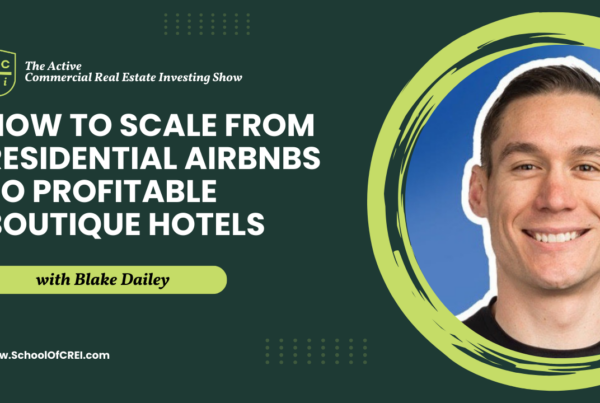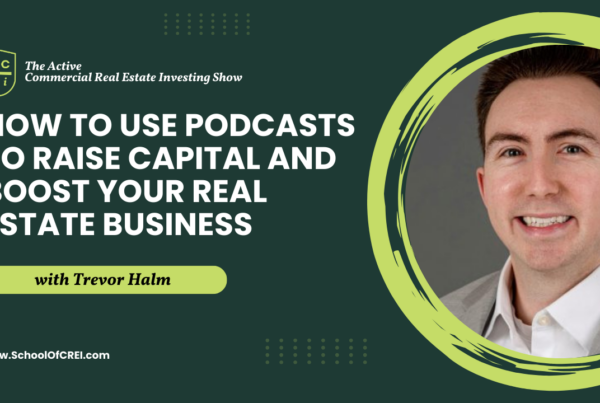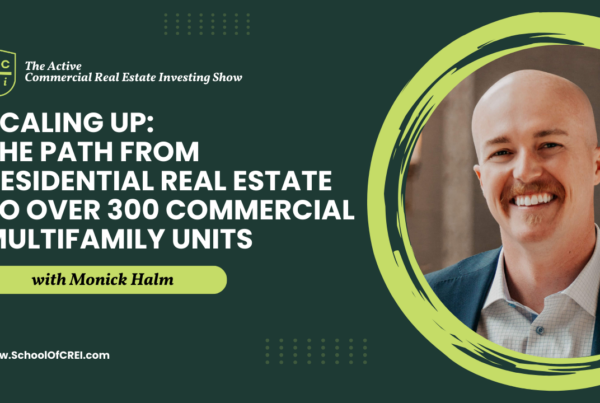EPISODE OVERVIEW
In this episode, Patrick and Noelle discuss the difference between active and passive investing in commercial real estate. They highlight the level of work and effort required for each approach and emphasize the importance of knowing what you want as an investor. They also explore the various avenues to enter the commercial real estate market, including real estate investment trusts (REITs) and crowdfunding platforms.
LISTEN
Transcript
Patrick
Hello and welcome to the active commercial real estate investing show brought to you by the one and only school of commercial real estate investing. I’m Patrick.
Noelle
And I’m Noelle.
Patrick
And this is episode number three.
Noelle
And on today’s episode, we are talking about something that is very important for your journey. There are different ways of going about investing in commercial real estate. I think so often we might know one path or the other, but it’s important to know that depending on your season of life and what you’re interested in, you have options. So those two options that you have are being an active investor or being a passive investor. And I do think it’s important to talk about the difference because your level of work or effort that you might wanna put into something for the return is going to look very different than someone else’s desire for the level of effort that they wanna put in. So think about what work you’re willing to do and what your personal journey looks like to discover what path or what mixed route you might want to take between active and passive investing.
Patrick
Absolutely. So with active investing, as indicated by the name, you are the investor or set of investors who are actively sourcing, vetting, securing debt, and acquiring, renovating, renting the properties. You’re doing all of that work, which requires active effort from you and your fellow investors. These folks are also called General Partners or GPs is another phrase you hear a lot that is more often than not synonymous with active investor in the commercial space. On the flip side of that, passive investors, as indicated by their name, oftentimes just provide the money or the capital for active investors to go out and deploy on their behalf. The neat thing about passive investing is that it requires substantially less work. Yes, you as a passive investor still need to do your due diligence. If you’re giving someone anywhere from $100 to $100,000 to a million dollars to $10 million, you need to be confident that what you’re investing in is going to provide a good return for you and that you have full confidence of the people investing it on your behalf. If you don’t, don’t invest in that particular deal or with that particular team or in that particular vehicle. So I wouldn’t say that passive investing is 100% passive because you should still be doing your own due diligence in that work. But once your money is deployed, you’re not having to worry about manage tenant expectations or deliver K-1 tax reports or forms or anything like that at the end of the year. So your day-to-day involvement is significantly reduced compared to active investors.
Noelle
Yeah. like we know a lot of people who want that, right? You say, OK, I have X amount of cash sitting around, but I really don’t want to take the energy to put, like to go and find the deal, to figure out what the deal should be. Like, I would much rather give this to someone that I trust and I know is going to bring me a better return than if I were to put it in the stock market, let’s say, or invest in something else. And that’s OK. You’re still going to get a return like with your GP like there is a good chance that you’re making an incredible return that you probably never would have gotten in a different type of venture or a different type of investment. But then there’s other people like no, I want that control. I want to go out. I want to find it. I want to put my blood, sweat and tears into it. You know, I want to be able to find vendors and someone to manage and I want to be able to, you know, find an agent who’s going to find me the right tenants. And that’s okay too like depending on what you want to do, some people have the drive and want that control and others want to be able to kick their feet back a little bit more and get some money at the end of the day that they probably wouldn’t have otherwise.
Patrick
That’s absolutely true. And I think there’s also different, you know, both of these types of investing provide different avenues to enter the commercial space. So if you have personally been investing in something like single family homes and you have experience of being a landlord and you’re familiar with the buying and selling of real estate at that level, you may be more likely to want to start to be an active investor in commercial real estate and you may have an elevated level of knowledge from your experience that helps you get into that game a little bit more efficiently. On the other hand, if you’re entering real estate investing without any experience and you don’t know where to start going full blown into multifamily syndication may feel like a really big jump for you to make depending on how fast you want to make it, it’s not impossible by any means but there’s a lot to learn in a very short amount of time, depending how fast you want to get started. On the flip side of that, there are a lot of avenues on the passive side that are attractive and have a much lower barrier of entry, right? So one of those is you can actually go to your 401k or your Roth IRA or your general brokerage account, and you can invest in things called real estate investment trusts. So real estate investment trusts, also known as REITs, effectively a form of passive investing in commercial real estate. You can often select if you wanted a, uh, if you want to invest in a blend, uh, or if you want to invest in a certain asset allocation, um, or, or certain asset class of commercial real estate through that trust. And so a lot of those you can buy for less than a hundred dollars a share. And then you can sell whenever you want, which is a beauty of it. It’s, it’s quick in, quick out and often the cost of entry is substantially lower than investing passively in a syndication, for example. A level up from that, I would say, not necessarily in terms of outcomes or returns, but just a higher level of due diligence is required on your end as a passive investor is investing in some of these more popular crowdfunding platforms where they’re effectively companies that have formed and are syndicators at scale. So they’re doing a massive amount of marketing. They’re getting a huge amount of dollars put in, and then they’re going as the active investors and deploying that capital into commercial real estate. And so you can, you can invest directly with them, set up an account, vet them and let them put your money to work. The third tier, which I would say requires the highest level of due diligence is, is investing directly with a syndicator. You just want to make sure that they have the experience you’re looking for, or that you have a good enough judge of their character to trust that they’re going to take your money and deploy it effectively and make good on their word. Because while there are certainly laws and regulations around what the GPs and active investors have to do from a fundraising perspective on the actual deploying of that capital side of things, you don’t have as much regulation, right? Like, so if someone’s not a good operator, they could cause the property to not generate the income it needs, which means you’re losing your money and there’s no recoiling from that. Like you’ve just lost your money. So I’m not trying to scare anybody from passive investing. It’s important. And investing with syndications and GPs directly can be a fantastic way to make great returns. Um, I’m just saying that always do your own due diligence. Always.
Noelle
Yeah. And know what you want out of what, where you want to put your investment to. Like know if you want to be in the details of what’s going on. You know, a good active investor who is getting money from others to be able to put into their investment is going to give you reports. They are going to tell you what’s going on the property and they’re going to make sure that you’re in the know. But if that’s not enough for you, take a hard look in the mirror and say, am I really wanting to be a passive investor in that case? Like if I want to know the details, do I just want to be leading those details instead? Both are great avenues, and both get you into generating wealth for you, for your family, allows you to be making a little bit more money that you can then apply the percentage effect on gaining increases and value and being able to have more money to put into bigger things, which ultimately will generate more wealth for you in the long run, regardless of which route you go, which I think is very important.
Patrick
Another interesting component to all of this that I think is worth mentioning, especially on this episode, is that there’s no right or wrong way to go about this. It’s, it’s as Noelle said earlier, it’s all about where you are in your stage of life and what you’re looking for in terms of your investment. And I think it’s important to note that there are different stages in your life where you may be interested in different approaches. So there may be a phase in your life where you are just wanting to get into the game. And so you want to invest passively with a lower cost to entry and less work day to day so that you can really start to learn what commercial real estate is all about. Then as you go on, you may decide, Hey, I’ve scaled up my investments here. I actually know a lot about the space and I want to take you know, try my hand at investing actively. It’s also possible to do the reverse of that, where when you’re young and you’ve got some more energy, you wanna go all in on the active side of things, and then maybe you do well for yourself and you want to convert to being more of a passive investor and free up your time a little bit more. You can also do a hybrid, where maybe you’re investing actively in multifamily, you’re interested in industrial or a different asset class, but you don’t have as much expertise or knowledge there. So you take some of the profits you earn from actively investing in multifamily and give that to a syndicator or GP or fund in the industrial space and let them put your money to work in that space for you. Right. So there’s, there’s no right or wrong way to approach this. It really is sitting down, taking a look at what you want out of it and figuring out where you are in your life and what makes sense for you.
Noelle
I love that no one size fits all. You can do one or all avenues. So that’s great. And I think that’s a great way to wrap up. This is obviously a very short episode, but as we talk about active investing versus passive investing, and if you follow it along, you know we have one show or both shows currently out. We are working on one to be able to put out the other as well. So we want you to know that as you’re looking at more of the active route, that will be geared towards the active investors. Our passive route will be geared towards the passive investors. And if you’re a hybrid, you’re going to just have to listen to both, I guess, so that you can get the best of both worlds. But we’re excited to have you on this journey with us. And we’re excited to share more information in each of those realms to help you along your journey.
Patrick
Yes. With that, be sure to subscribe, stay tuned for upcoming episodes. And if you haven’t visited the website yet, please head over to SchoolOfCREI.com for more.







